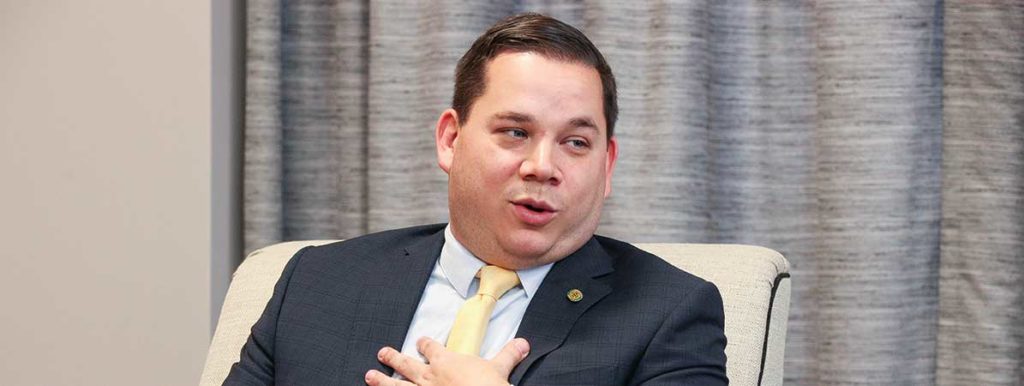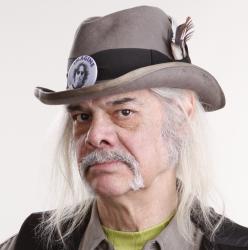Ryan McMahon, who was recently elected Onondaga County Executive by the County Legislature, believes he is the only person in the history of the county to have gained a unique perspective on running the governments of both the county and the city of Syracuse.
“I was a city councilor,” he reflects. “I was the chair of the County Legislature, and I am now county executive. I’m learning every day that you have to drive an agenda and be a voice for the region when going to Albany or (Washington) D.C. on every issue big and small.”

McMahon says his current agenda is dominated by “three issues we talk about every day, and our team gets sick about hearing them. But they’re all related and we need to improve on every one of these issues or else we can’t meet our potential as a community: our modernization of our infrastructure; reapplying and reworking our efforts on economic development; and then the third, which I think is our community’s moral calling, is poverty. So the question becomes: What do we do, and how do we get the message out to the public?”
“The question becomes: What do we do, and how do we get the message out to the public?” — Ryan McMahon
McMahon says that if we educate the public on these issues and address why they’re important, we’ll have the will from the community to get the agenda through whatever legislative body we need to get the agenda through. He is working to educate the public on his issues through town hall meetings ranging from Fayetteville to the Southwest Community Center, including Cicero, Skaneateles and Salina, as well as collaborating with groups like Leadership Greater Syracuse and the NAACP.
Among other age-unique perspectives, McMahon’s colleagues on the County Legislature elected him their chair, the youngest ever to serve in that role, at age 38. He first sat on that board to represent constituents in the City of Syracuse and the towns of Geddes and Onondaga. He will probably not, however, be doing too much boasting about another job he has inherited with the county gig: major mover for the water system.
“Our sewer system, in particular, is failing,” he notes. “Part of the problem that we and the DEC agree on is that the pipes are the problem.”
Related: Q&A | Joanie Mahoney: ‘The community deserves a fresh set of eyes’
The problem is compounded, McMahon observes, by the county not owning the pipes. They are owned by the city and towns that don’t have the money to fix them.
“It means new pipes,” he says, “and we need to figure out who pays for the pipes, and we (the county) are not going to pay for the pipes unless we own the pipes. Once our infrastructure is in good order, we have the ability to take advantage of our greatest resource we have in Central New York, which is our water.”
As much time as is required to enhance the economic development that McMahon seeks — asking business owners what are their plans to expand, who do they do business with and how can we get them here — he insists his most important job is being a dad.
“I have a wonderful wife, and she needs help at night. So we still get our kids off to school in the morning, and I’m there most nights to put them to bed, and on weekends I’m still coaching my son’s basketball and soccer teams. So we’re going to make it work for our family.”
To make it work for other county families, McMahon knows his administration must foster opportunity. “Where do we have industries that make sense to be here?” he asks. “We need to develop the jobs of tomorrow that kids can get an education in high school and move into without having to go and get four-year and six-year degrees to do it. I met with BOCES and the city school district’s adult education team, and they’re tied into a lot of workforce development.”
For McMahon, one target for development is the actual engagement with the issue of poverty. “We have severe poverty in our minority communities,” he admits, “When you’re looking at percentages, we’re making progress. It was 35 percent two years ago, and it’s 32 percent now. I think the community has started to wake up to this issue. We are in the human services business, so we are the government that is tasked with poverty every day. With that it seems we have moved on from the initial problem to the core of the poverty issue.”
Reflecting on his several public service identities, McMahon senses a momentum in the community. “In many categories we overachieve compared to other communities our size,” he projects. “I think the partisan bickering in Albany and D.C. isn’t here right now, so we are really focused on listening and fixing our problems. We’re listening at all our town halls. We’re a community that when we have gotten knocked down, we have gotten up again and improved every day.”



